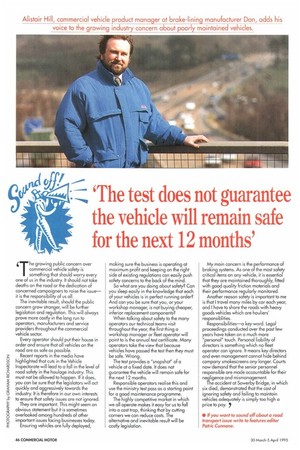The test does not guarantee the vehicle will remain safe for the next 12 months'
Page 48

If you've noticed an error in this article please click here to report it so we can fix it.
‘T
he growing public concern over commercial vehicle safety is something that should worry every one of us in the industry. It should not take deaths on the road or the dedication of concerned campaigners to raise the issue— it is the responsibility of us all The inevitable result, should the public concern grow stronger, will be further legislation and regulation. This will always prove more costly in the long run to operators, manufacturers and service providers throughout the commercial vehicle sector.
Every operator should put their house in order and ensure that all vehicles on the road are as safe as possible.
Recent reports in the media have highlighted that cuts in the Vehicle Inspectorate will lead to a foil in the level of road safety in the haulage industry. This must not be allowed to happen. If it does, you can be sure that the legislators will act quickly and aggressively towards the industry. It is therefore in our own interests to ensure that safety issues are not ignored. They are important. This might seem an obvious statement but it is sometimes overlooked among hundreds of other important issues facing businesses today. Ensuring vehicles are fully deployed, making sure the business is operating at maximum profit and keeping on the right side of existing regulations can easily push safety concerns to the back of the mind. So what are you doing about safety? Can you sleep easily in the knowledge that each of your vehicles is in perfect running order? And can you be sure that you, or your workshop manager, is not buying cheaper, inferior replacement components? When talking about safety to the many operators our technical teams visit throughout the year, the first thing a workshop manager or fleet operator will point to is the annual test certificate. Many operators take the view that because vehicles have passed the test then they must be safe. Wrong. The test provides a "snapshot" of a vehicle at a fixed date. It does not guarantee the vehicle will remain safe for the next 12 months.
Responsible operators realise this and use the ministry test pass as a starting point for a good maintenance programme.
The highly competitive market in which we all operate makes it easy for us to fall into a cost trap, thinking that by cutting corners we can reduce costs. The
alternative and inevitable result will be costly legislation. My main concern is the performance of braking systems. As one of the most safety critical items on any vehicle, it is essential that they are maintained thoroughly, fitted with good quality friction materials and their performance regularly monitored. Another reason safety is important to me is that I travel many mikes by car each year, and I have to share the roads with heavy goods vehicles which are hauliers' responsiblities. Responsibilities—a key word. Legal proceedings conducted over the past few years have taken on a much more "personal" touch, Personal liability of directors is something which no fleet operator can ignore. It means key directors and even management cannot hide behind company smokescreens any longer. Courts now demand that the senior personnel responsible are made accountable for their negligence and mismanagement. The accident at Sowerby Bridge, in which six died, demonstrated that the cost of ignoring safety and failing to maintain vehicles adequately is simply too high a price to pay.
































































































